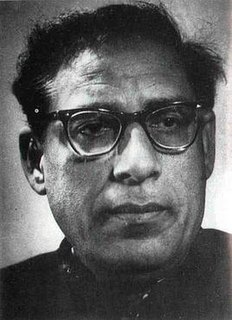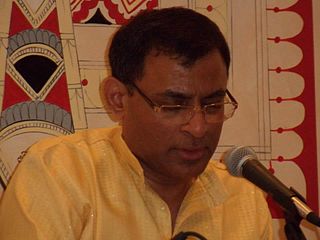Pandit Pran Nath was an Indian classical singer and teacher of the Kirana gharana.

Ustad Amir Khan was an Indian classical vocalist and the founder of the Indore gharana.
A thaat is a "Parent scale" in North Indian or Hindustani music. The concept of the thaat is not exactly equivalent to the western musical scale because the primary function of a thaat is not as a tool for music composition, but rather as a basis for classification of ragas. There isn't necessarily strict compliance between a raga and its parent thaat; a raga said to 'belong' to a certain thaat need not allow all the notes of the thaat, and might allow other notes. Thaats are generally accepted to be heptatonic by definition.
Pandit Nikhil Ranjan Banerjee was an Indian classical sitarist of the Maihar Gharana. A student of the legendary Baba Allauddin Khan, Pandit Nikhil Banerjee was known for his technical virtuosity and clinical execution. Along with Pandit Ravi Shankar and Ustad Vilayat Khan, he emerged as one of the leading exponents of the sitar. He was a recipient of the Indian civilian honour of the Padma Bhushan.
Dhanashree is an Indian classical raga that appears in the Sikh tradition from northern India and is part of the Guru Granth Sahib.

Umakant Gundecha and Ramakant Gundecha, known as the Gundecha Brothers, are Dagarvani dhrupad singers. Together they have been awarded Padma Shri for 2012 in the field of Art - Indian Classical Music - Vocal - Madhya Pradesh.
Ustad Bundu Khan was a sarangi player during the first half of the 20th century.

Hamsadhvani also spelled as Hansadhwani, is a rāga in Carnatic music. It is an audava rāgam. It is a janya rāga of the Melakartha raga, Dheerasankarabharanam (29th) but according to Hamsadhvani's prayoga or the way it is sung it is said to be the janya of Kalyani (65th).
The Jaipur-Atrauli Gharana is a Hindustani music apprenticeship fraternity (gharana), founded by Alladiya Khan (1855–1946) in the late-19th century.

Malkauns is a raga in Indian classical music. It is one of the oldest ragas of Indian classical music. The equivalent raga in Carnatic music is called Hindolam, not to be confused with the Hindustani Hindol.
Viram Jasani is a Kenyan-born Indian sitar and tabla composer and musician. He is best known for playing tabla drums on the song "Black Mountain Side" from Led Zeppelin's 1969 debut album. He was awarded an honorary degree from the University of York in March 2007.
Ustad Nissar Hussain Khan (1909–93) was an Indian classical vocalist from the Rampur-Sahaswan gharana. He was a disciple and son of Fida Hussain Khan and after a long and illustrious career was awarded the Padma Bhushan in 1971. He was the court musician of Maharaja Sayajirao Gaekwad III at Baroda and was featured extensively on All India Radio. He was a specialist in Tarana. His most famous disciples are Ghulam Mustafa khan and Rashid Khan.

Ranjani and Gayatri are sisters who are Carnatic vocalists and violinists. Their work includes studio recordings, television, radio, concerts, festivals and lecture demonstrations. They have appeared as soloists, violin duos, accompanists, vocal duos, composers, educators and ambassadors of Indian Classical Music.
Charanjit Singh was an Indian musician from Mumbai, who performed as a session musician, often as a guitarist or synthesizer player, in numerous Bollywood soundtrack orchestras from the 1960s to 1980s, working with filmi composers such as Shankar-Jaikishan, R.D. Burman, S.D. Burman, and Laxmikant-Pyarelal. Singh led a wedding band and recorded and released a number of albums covering popular film songs. These were a form of instrumental elevator music, some of which have since been re-released by Sublime Frequencies, such as his steel guitar renditions of "Manje Re" from Bandhe Haath in 1973 and "Chura Liyaa Hai Tumne" from Yaadon Ki Baaraat in 1975. In 1981, he produced synthesizer-based electronic renditions of the Silsila soundtrack in his record Charanjit Singh: Plays Hit Tunes on Synthesizer of Silsila.

Full Circle: Carnegie Hall 2000 is a live album by Indian musician and composer Ravi Shankar, released in 2001 through the record label Angel Records. Recorded at Carnegie Hall in October 2000 as part of a tour with Shankar's daughter Anoushka, the album contains five tracks and presents two ragas. The concert occurred sixty-two years after Shankar's first performance at Carnegie Hall and commemorated his eightieth birthday; the album was his first live recording in nearly twenty years. Full Circle was produced by Hans Wendl, mastered by Scott Hull, and mixed and engineered by Tom Lazarus. Featured are performances by Tanmoy Bose and Bickram Ghosh on tabla, and Anoushka and Ravi on sitar.
Pandit Kushal Das, born in Kolkata in 1959, is an Indian classical sitar and surbahar player.

Ravi Shankar's Festival from India is a double album by Indian musician and composer Ravi Shankar, released on World Pacific Records in December 1968. It contains studio recordings made by a large ensemble of performers, many of whom Shankar had brought to the United States from India. Among the musicians were Shivkumar Sharma, Jitendra Abhisheki, Palghat Raghu, Lakshmi Shankar, Aashish Khan and Alla Rakha. The project presented Indian classical music in an orchestral setting, so recalling Shankar's work as musical director of All India Radio in the years before he achieved international fame as a soloist during the 1960s.

Milind Chittal is an Indian classical vocalist. Chittal is the son of Kannada writer Yashwant Chittal. He trained under Firoz Dastur of the Kirana Gharana. He is also a qualified chartered accountant.
Bhairavi is one of the ten basic thaats of Hindustani music from the Indian subcontinent. It is also the name of a raga within this thaat.
This page is based on this
Wikipedia article Text is available under the
CC BY-SA 4.0 license; additional terms may apply.
Images, videos and audio are available under their respective licenses.











